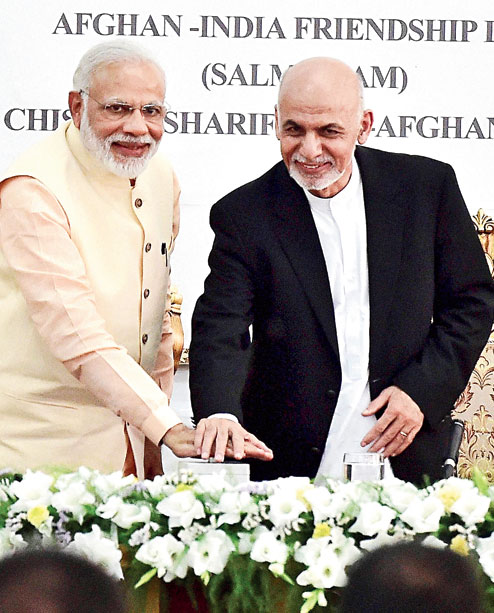
New Delhi, June 4: Prime Minister Narendra Modi today used the inauguration of a dam 40 years in the making in western Afghanistan to assure the country that India would not repeat its effective abandonment of the country in the 1990s, come what may.
Modi joined Afghan President Ashraf Ghani in symbolically opening the sluice gates that allowed water to rush into the dam's reservoir, from where it will be used for irrigation and generation of hydro-electric power.
The Afghanistan-India Friendship Dam, a project earlier called the Salma Dam, isn't an example of a project delivered on time - the initiative was initially conceived in 1976. Nor is it the largest development project India has completed abroad in recent years - the dam will produce 42MW of power and irrigate 75,000 hectare or 750sqkm, the size of Hirakud lake in Odisha.
But the dam was built mostly since 2001, under the shadow of war and terrorism, using concrete, steel reinforcement and explosives shipped to Bandar Abbas port in Iran, and then driven 1,200km to the city of Herat, the site of the dam.
At a time the US is withdrawing from Afghanistan, the Taliban remains aggressive and peace stays elusive, the dam's inauguration - finally - offered Modi a chance to highlight the duration of India's commitment to the country.
"For others, their commitments may have a sunset clause, but our relationship is timeless," Modi said in an address at the inauguration today. "India will not forget or turn away."
The message was aimed at Afghans, but also the US, which began the War on Terror by attacking the Taliban but is now retreating, Pakistan, which views Afghanistan as a proxy for battles with India, and China, increasingly influential in the region.
Modi, who later in the afternoon was awarded the Amir Amanullah Khan Award, Afghanistan's highest civilian honour, portrayed India as a country that would stay committed to the bilateral relationship.
In the 1990s, India had withdrawn from Afghanistan, shutting its missions, after the country was taken over by the Taliban. That withdrawal, forced in part by India's inability to recognise the Taliban as the official rulers of Afghanistan, allowed Pakistan to deepen its footprint in the country.
The Afghan government is trying to re-engage the Taliban in a dialogue for a plan towards a reconciliation. Today, Modi conceded that Afghanistan's path may not be easy.
"Whatever happens, in a bright or a dark moment, we will always experience, as Herat's great Sufi Poet, Hakim Jami, would say, the freshness and happiness of the gentle breeze of friendship," the Indian Prime Minister said.
To drive home his point, Modi next visited the Indian consulate in Herat, which was attacked by terrorists the day he was sworn in on May 26, 2014.
The Indian embassy in Kabul and every one of the country's four consulates in Afghanistan have faced terror strikes over the past decade, in all leading to over 150 deaths.
"India's capacity may be limited, but our commitment is without limits," Modi said. "Our resources may be modest, but our will is boundless."

